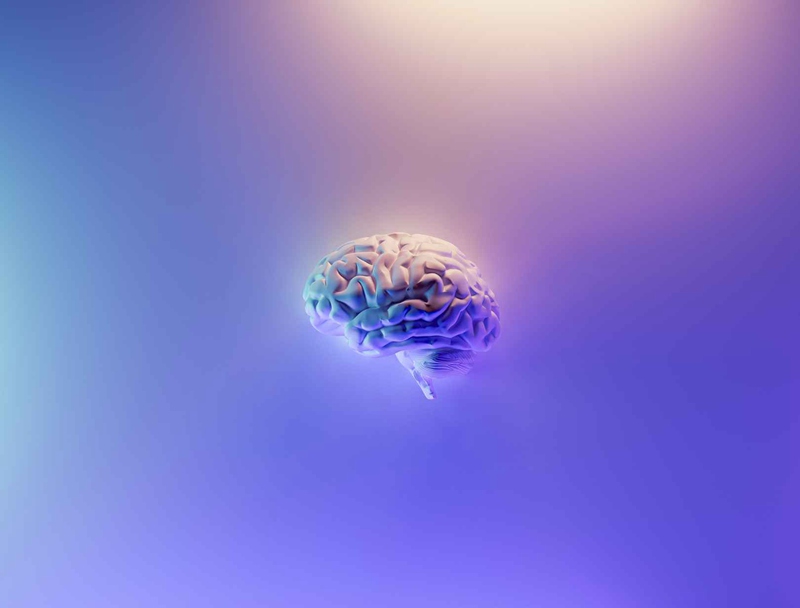 Two comparison images of brain site activation in a person with hearing loss in response to a visual motion stimulus. In the left image, before the use of hearing aids, the brain's vision center has compensated for the hearing loss by recruiting areas typically used for hearing (i.e., "cross-modal recruitment”). In the right image, after 6 months of hearing aid use, a reversal of this recruitment has occurred, resulting in a more typical brain activation. Image from the research of Hannah Glick and Anu Sharma at the University of Colorado-Boulder. Courtesy of The Hearing Review.
Two comparison images of brain site activation in a person with hearing loss in response to a visual motion stimulus. In the left image, before the use of hearing aids, the brain's vision center has compensated for the hearing loss by recruiting areas typically used for hearing (i.e., "cross-modal recruitment”). In the right image, after 6 months of hearing aid use, a reversal of this recruitment has occurred, resulting in a more typical brain activation. Image from the research of Hannah Glick and Anu Sharma at the University of Colorado-Boulder. Courtesy of The Hearing Review.However, according to the authors, this neural compensation may come at a cost. Over time, these adaptive changes may become maladaptive, resulting in the inaccurate processing of sensory input, increased mental effort, and greater cognitive fatigue. Rather than simply filling in the blanks, the cognitive maladaptation hypothesis suggests that the brain may recalibrate in response to suboptimal input from hearing and vision, thereby causing confusion and straining cognitive resources. This, in turn, may accelerate cognitive decline, especially in individuals who already have vulnerabilities like those with less education, mild cognitive impairment (MCI), depression, diabetes, or cardiovascular disease, and perhaps patients with polypharmacy issues.
One study cited in the article, for example, found that adults with untreated age-related hearing loss showed earlier frontal-lobe responses on auditory tests—and those early responses were linked to worse speech-in-noise understanding. In other words, the brain might be “jumping the gun,” trying too hard to compensate, but doing so inefficiently.
The result? A possible vicious cycle: untreated hearing and/or vision loss may lead to brain changes, which reduce auditory and visual processing efficiency and increase mental strain, ultimately contributing to long-term degradation and cognitive issues.
“As of this writing, none of us has clear or indisputable evidence with regard to the veracity of any of the many available hypotheses,” coauthor Dr. Douglas Beck told HearingTracker. “Eventually, some, all, or none may prove to be true. In the meantime, all we can do is try to rationally understand the degradation process of the human brain as it relates to cognitive decline, to better prevent the same in years to come.”

Douglas Beck, AuD.
Other existing hypotheses for why hearing loss may be associated with cognitive decline and dementia
Before the Cognitive Maladaptation Hypothesis, several other theories have been proposed to explain the hearing-cognition connection. Each shines a light on a different part of the puzzle:
- The Harbinger Hypothesis suggests that hearing loss is not a cause but an early indicator of dementia—essentially a warning sign of underlying brain changes. It also notes that hearing loss may make people perform worse on cognitive tests simply because they can’t hear the instructions.
- The Cognitive Load Hypothesis argues that hearing loss increases mental effort, pulling attention and memory resources away from other tasks. This long-term “listening effort” could wear down the brain’s capacity for thinking.
- The Cascade Hypothesis (aka, social isolation theory) offers a behavioral explanation: hearing loss leads to social withdrawal, loneliness, and depression—all factors associated with increased dementia risk.
- The Common Cause Hypothesis (aka, multi-hit theory) says that both hearing loss and cognitive decline may stem from shared biological factors like vascular disease, inflammation, or genetics, rather than one causing the other.
Any or all of these factors could help explain why hearing loss is associated with cognitive decline/dementia. However, there are limitations, as some fail to explain fully why people with no other health issues develop both hearing loss and dementia. Others don’t account for the wide variability in who experiences cognitive decline, or how brain structure (i.e., anatomy) and function (i.e., physiology) adapt to long-term auditory deprivation.
Why the Cognitive Maladaptation Hypothesis matters
The authors suggest that current models may not fully capture the dynamic, brain-based consequences of untreated hearing loss. The Cognitive Maladaptation Hypothesis helps fill this gap by focusing on how the brain’s attempts to “reorganize” itself in response to degraded hearing can backfire, particularly over months, years, or decades.
Importantly, this hypothesis aligns with emerging evidence from neuroscience and audiology:
- Studies show that the brain reallocates cognitive resources, particularly in the frontal cortex, to help interpret speech in noise when hearing is degraded.
- Chronic listening effort has been linked to fatigue, reduced working memory, and even anxiety.
- Preliminary research suggests these changes may be at least partially reversible with hearing aids. When amplification restores appropriate auditory input, some studies show normalization of brain activation patterns, as shown in the images above.
This framework also helps explain why early hearing care intervention may be so important. Once maladaptive neural patterns become entrenched, they may be more difficult to reverse—especially for older adults with limited cognitive reserve or reduced neuroplasticity.
“As the Livingston et al's Lancet studies indicate, the more effective diagnosis and intervention period likely occurs in middle age—before neuroplastic and neuropathy damage has occurred,” says Beck. “In essence, it seems easier to maintain function than to try to recreate it later.”
Clinical and public health implications
Although the Cognitive Maladaptation Hypothesis remains a theory, it raises important clinical questions. Could untreated hearing loss alter the brain in ways that increase dementia risk? Can timely treatment—such as properly fitted hearing aids—prevent or even reverse these changes?
Findings from the ACHIEVE study offer a promising glimpse. For older adults who had health problems and were at greater risk of cognitive decline, the use of hearing aids over 3 years was associated with nearly 50% less cognitive decline compared to a control group. While more modest effects were seen in healthier participants, longer-term studies may reveal benefits over time. This adds weight to the call for early proactive care.
The current study authors emphasize that comprehensive audiometric assessment, early diagnosis, and timely treatment may not only improve communication but could also support long-term brain health. Moreover, it places more urgency on coordination between audiologists, neurologists, geriatricians, and primary care providers. Integrating speech-in-noise testing and cognitive screening into routine hearing care protocols may help identify high-risk individuals earlier and guide more personalized care. These protocols are already identified as within the scope of practice for audiologists by the American Academy of Audiology (AAA) and American Speech-Language Hearing Association (ASHA).
Might our brains try too hard to compensate for hearing loss?
The connection between hearing loss and cognitive decline is no longer a fringe idea; it’s a well-supported correlational relationship. But exactly how hearing loss might contribute to that decline is still under investigation.
The Cognitive Maladaptation Hypothesis offers new insights: one that views the brain’s adaptive response to hearing loss not always as helpful, but sometimes as detrimental. If true, this would underscore the urgent need for early hearing care intervention—not just to help people hear better, but to support healthier aging and cognitive function.
"I think the key to cognitive health as we age has a lot to do with maintaining and preserving brain health via the two primary sensory inputs to the brain: vision and hearing,” says Beck. “It is no longer acceptable to simply screen hearing or vision; we need the details. It is no longer acceptable to say, 'Your hearing loss is normal for your age.' That’s ridiculous. After 42 years as an audiologist, I feel very confident saying hearing loss is common, but it is not normal. There is no 'normal for your age' diabetes, 'normal for your age' lower back pain, migraines, or sleep deprivation. These conditions may be common, but they are not normal.”
Original article citation: Glick HA, Beck DL, Darrow K, Trinh J. The cognitive maladaptation hypothesis: how sensory deprivation could contribute to cognitive decline. J Otolaryngol-ENT Res. 2025;17(2). Published online May 12, 2025.
The above is the interpretation of When Hearing Loss Changes the Brain: A New Hypothesis for Understanding Cognitive Decline provided by Chinese hearing aid supplier Shenrui Medical. Link https://www.sengdong.com/Blog/When-Hearing-Loss-Changes-the-Brain-A-New-Hypothesis-for-Understanding-Cognitive-Decline.html of this article is welcome to share and forward. For more hearing aid related information, please visit Blog or take a look at our Hearing aids products







